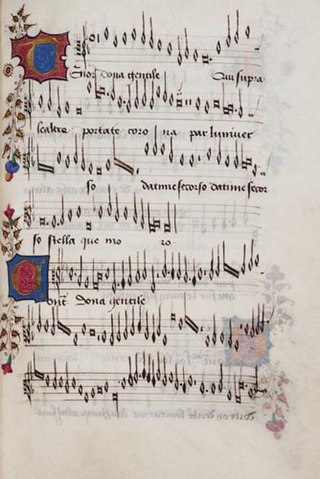Related Research Articles

Broadcast Music, Inc. (BMI) is a performance rights organization in the United States. It collects blanket license fees from businesses that use music, entitling those businesses to play or sync any songs from BMI's repertoire of over 20.6 million musical works. On a quarterly basis, BMI distributes the money to songwriters, composers, and music publishers as royalties to those members whose works have been performed.
Copyrights can either be licensed or assigned by the owner of the copyright. A copyright collective is a non-governmental body created by copyright law or private agreement which licenses copyrighted works on behalf of the authors and engages in collective rights management. Copyright societies track all the events and venues where copyrighted works are used and ensure that the copyright holders listed with the society are remunerated for such usage. The copyright society publishes its own tariff scheme on its websites and collects a nominal administrative fee on every transaction.
A performance rights organisation (PRO), also known as a performing rights society, provides intermediary functions, particularly collection of royalties, between copyright holders and parties who wish to use copyrighted works publicly in locations such as shopping and dining venues. Legal consumer purchase of works, such as buying CDs from a music store, confer private performance rights. PROs usually only collect royalties when use of a work is incidental to an organisation's purpose. Royalties for works essential to an organisation's purpose, such as theaters and radio, are usually negotiated directly with the rights holder. The interest of the organisations varies: many have the sole focus of musical works, while others may also encompass works and authors for audiovisual, drama, literature, or the visual arts.
The Society of Composers, Authors and Music Publishers of Canada (SOCAN) is a Canadian performance rights organization that represents the performing rights of more than 175,000 songwriters, composers and music publishers. The organization collects license fees through a music licensing program approved by the Copyright Board of Canada.

PRS for Music Limited is a British music copyright collective, made up of two collection societies: the Mechanical-Copyright Protection Society (MCPS) and the Performing Right Society (PRS). It undertakes collective rights management for musical works on behalf of its 160,000 members. PRS for Music was formed in 1997 following the MCPS-PRS Alliance. In 2009, PRS and MCPS-PRS Alliance realigned their brands and became PRS for Music.
A royalty payment is a payment made by one party to another that owns a particular asset, for the right to ongoing use of that asset. Royalties are typically agreed upon as a percentage of gross or net revenues derived from the use of an asset or a fixed price per unit sold of an item of such, but there are also other modes and metrics of compensation. A royalty interest is the right to collect a stream of future royalty payments.
APRA AMCOS consists of Australasian Performing Right Association (APRA) and Australasian Mechanical Copyright Owners Society (AMCOS), both copyright management organisations or copyright collectives which jointly represent over 100,000 songwriters, composers and music publishers in Australia and New Zealand. The two organisations work together to license public performances and administer performance, communication and reproduction rights on behalf of their members, who are creators of musical works, aiming to ensure fair payments to members and to defend their rights under the Australian Copyright Act (1968).
Music licensing is the licensed use of copyrighted music. Music licensing is intended to ensure that the owners of copyrights on musical works are compensated for certain uses of their work. A purchaser has limited rights to use the work without a separate agreement.
The International Confederation of Societies of Authors and Composers is an international non-governmental, not-for-profit organisation that aims to protect the rights and promote the interests of creators worldwide. It advocates for strong legal protection of copyright and authors' rights. It is the world's largest international network of authors' societies, also known as Collective Management Organisations (CMOs), copyright / royalty collection societies, collecting societies, or Performing Rights Organisations (PROs).

The Spanish Society of Authors and Publishers is the main collecting society for songwriters, composers and music publishers in Spain. It is similar to AGADU, ASCAP, GEMA, SADAIC, SACEM and SAYCO. The philologist, poet, composer, scriptwriter, movie and television director and producer Antón Reixa (1957) is the Chairman of the Board of Directors since May 2012. SGAE was founded in 1889 as Society of Authors of Spain. In 1995, its name changed to Society of Authors and Publishers, seeking to accommodate cultural editors.

The Gesellschaft für musikalische Aufführungs- und mechanische Vervielfältigungsrechte is a government-mandated collecting society and performance rights organization based in Germany, with administrative offices in Berlin and Munich. GEMA represents the usage rights stemming from authors' rights for the musical works of those composers, lyricists, and publishers who are members in the organization. It is the only such institution in Germany and a member of BIEM and CISAC. Other collecting societies include the (AKM) Society of authors, composers and music publishers in Austria and SUISA in Switzerland.

Music publishing is the business of creating, producing and distributing printed musical scores, parts, and books in various types of music notation, while ensuring that the composer, songwriter and other creators receive credit and royalties or other payment. This article outlines the early history of the industry.

STIM, Svenska Tonsättares Internationella Musikbyrå, is a Swedish collecting society for songwriters, composers and music publisher. Its role is to act as an agent for its members in order to collect license fees whenever their musical works are performed in public, broadcast or transmitted, and to pay out performing royalties.

A digital DJ licence is required in some countries, including the United Kingdom, Finland, Belgium and Italy, to publicly play digital copies of copyrighted music. The licence allows a DJ to copy music from original CDs, vinyl or other media, to a computer's hard drive, an MP3 player or other digital audio players, for example to be used with a vinyl emulation software program, or in some cases to other digital media, such as CD-R or MiniDisc. In the countries where digital DJ licensing is used, the licence is also required for playing music originally bought and downloaded directly on to a computer, usually in MP3 or similar format, unless the licence of the online music store explicitly allows the public performance of the downloaded tracks.
The Composers, Authors and Publishers Association of Canada was a Canadian copyright collective for the right to communicate with the public and publicly perform musical works. CAPAC administered these rights on behalf of its members and those of affiliated international organizations by licensing the use of their music in Canada. Royalties were paid to the music creators after administration costs were deducted to pay for the operation of CAPAC.
KODA is the collecting society for songwriters, composers and music publishers of Denmark.
SAMRO, the Southern African Music Rights Organisation, is a copyright asset management society. It was established by the South African Copyright Act, and aims to protect the intellectual property of music creators by licensing music users, collecting licence fees and distributing royalties to music creators. SAMRO represents more than 15,000 Southern African music composers, lyricists/authors and music publishers. The organisation administers performing rights.
The Society of Authors, Composers and Music Publishers in Israel, known by the acronym ACUM, is a non-profit copyright collective which engages in collective rights management for authors, poets, lyricists, composers, arrangers, and music publishers in Israel. As a member of the International Confederation of Societies of Authors and Composers (CISAC), ACUM is affiliated with more than 100 similar rights organizations around the world, with which it engages in reciprocal royalty collection agreements. It also holds an annual prize ceremony which honors authors and musicians in many categories, including lifetime achievement.
The Korea Music Copyright Association (KOMCA) is a South Korean non-profit copyright collective for musical works, administering public performance and broadcasting rights, and mechanical recording and reproduction rights. Founded in 1964, it is the second collective rights management organization for musical works in Asia, after JASRAC in Japan. It is also one of the largest in Asia, with over 40,000 members. In 2021, it collected ₩289 billion in licensing fees and distributed ₩256 billion in royalties to its members.